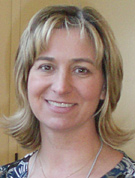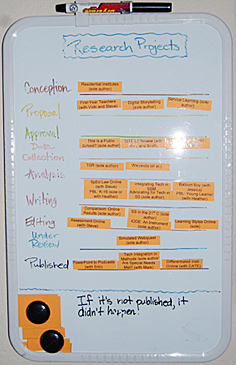

Christy Keeler, a pedagogy scholar/consultant for the Teaching American History Grant for Las Vegas's Clark County School District, uses a blog to motivate herself to write and as a means of personal accountability. “My goal is to blog every time I write for a peer-reviewed publication,” she said. “Though I sometimes get lazy, and don’t log my time and progress, such as over the summer when I was writing infrequently, I’m usually pretty good about blogging during each writing session.” Keeler also has several other blogs that she uses to support her teaching. She taught for two years as a visiting professor at the University of Nevada, Las Vegas (UNLV). She’s now considered a part-time instructor at UNLV, because of her work with the Teaching American History Grant. As a pedagogy scholar/consultant at UNLV, Keeler teaches 50 third- through fifth-grade teachers in five-week modules six times each year. “The modules couple pedagogy and history, and I work with two historians who teach the history content while I teach the pedagogy,” she said. With her teaching and family responsibilities – Keeler and her husband have two young sons – blogging is a way to organize her professional and personal writing life. The path that led her to blogging her writing efforts started about two years ago, when UNLV offered its faculty the ability to attend a workshop presented by Tara Gray, entitled “Publish and Flourish: Become a Prolific Scholar" (this workshop is co-sponsored by TAA). “It was fantastic; we were all motivated to write and broke into writing groups following the training,” she said. “My group lasted for over a year, and we were very supportive of one another.” Keeler discovered, however, that even with the writing group, she still became complacent about her writing. She would fail, for instance, to bring writing samples to the weekly meetings. “My group didn’t hold me as accountable as I needed to be, so I knew I needed a different motivational method,” she said. “At about that time, I was beginning to experiment with blogs for use in my classes, and I thought that a blog might provide a means of personal accountability.” Some of the main benefits of blogging are that it's easy and fast, said Keeler. “Though I am keeping the blog for myself, it also increases my feeling of accountability, because I know anyone can look at it and judge my dedication to my writing efforts," she said. "Therefore, I feel guilty when I know I haven’t written in awhile.” Keeler always blogs about where she is in the process of a given project. “This enables me to review where I left off on the previous writing session so I can pick up there, instead of having to review the entire document on which I’m working,” she said. “Also, it’s been great for me to go back and recall who I’ve contacted regarding a paper, which journals have rejected articles, which journals are reviewing articles and other progress.” During Gray's workshop, she stressed the importance of writing religiously for 15 minutes every day, said Keeler, but that was the one piece of advice she hasn't followed. “Given my life as a wife and mother first, and a scholar second, this never works for me,” she said. “I am much better at writing in spurts – usually right before a project is due. My goal is to write as often as I can. My blog has proven that the more often I write, the more often I have articles published." Ideally, Keeler said she would like to have an “accountability partner", in which each author would blog and use RSS to review each other’s blogs. That way, they could check up on each other several times a week. “We could also leave encouraging notes for one another as comments in our blogs,” she said. A blog also could work well for collaborators on a writing project, she said: “If each of the collaborators logged their work on the project each time they contributed, there would be a nice accounting of the progress made and the next steps to take. There are other online applications such as Google Docs and spreadsheets that allow collaborators to work jointly on writing projects, but blogs provide a nice accounting of progress. The blog entries can automatically and immediately be downloaded to all group members’ computers as soon as comments are posted.” Blogs are easy to create, and very easy to use, Keeler said. She believes so strongly in the value of blogging that she’s created videos about it. They can be accessed by downloading iTunes and subscribing to the “Keeler’s Training Videos” podcast or by visiting http://keelertrainingvideos.blogspot.com. She suggests the following episodes, “Using, Posting and Commenting in Blogs,” “Introduction to Blogger” and “Procuring a Blogger Account.” Don't know how to subscribe to a podcast? Keeler recommends the online video “iTunes Basics,” which can be found on one of her websites: Click here. This video is also available via the "Keeler's Training Videos" podcast.
Along with blogging, other ways Keeler has kept herself accountable to her writing are by using Academic Ladder, which provides online academic writing coaching; a writing board in her office; a Microsoft Word document detailing parts and due dates for each project in her office; and logging her writing times on her handheld computer/phone. Keeler used Academic Ladder for one month, and experienced an incredibly productive month. “It was very motivating, because I knew that I had paid for the service, and I wanted to make sure I hadn’t wasted the money,” she said. “It’s also very rewarding to mark a little checkbox each day after you write.” Someday, Keeler said she’d like to see something similar to Academic Ladder that could be used by academic advisors. This could be a great resource for dissertation advisors to help keep their students on task. It also could provide advisors with readily available information about the progress of their students. “That way, there would be accountability online as well as in the face-to-face environment." The writing board is a tool Keeler learned about several years ago while attending the American Educational Researcher Association (AERA) Annual Meeting. The idea is to keep a board listing all of your projects and moving the projects across the board as they progress from conception to publication.
“Not only is this a visual reminder of current projects – and a constant reminder of those projects hiding in the shadows of your file drawer – but it helps organize projects so you always have some in various stages of the writing process,” she said. “The AERA presenter said that it is important for a healthy writer to always have projects in different stages, so that there is no dead time in between projects.” A benefit to these tools from Keeler’s life is that if she has a research project stuck in an Institutional Review Board (IRB) review process or is under review with a journal, she can work on another project listed on her writing board. “The result is that I should have a regular schedule for rolling out new articles,” she said. “This is especially good if one is expected to produce peer-reviewed articles every year.” To create her writing board, she used a white board and Sharpies to devise the sections. She then printed out all of her writing projects on bright paper and placed a magnet on the back of the page. She cut out each article and placed the project titles into the correct section. “This sits right next to my desk so it’s like a weight around my neck if nothing’s moved lately,” she said. Keeler also has a similar document she maintains simultaneously in a Word document on her computer. She can share this with potential employers and also record anticipated completion dates for each aspect of each writing project. “There are simple and inexpensive programs that allow individuals to log their time spent on given tasks throughout the day,” said Keeler, who uses SDS Time to calculate the amount of time she spends each week on her writing. The program allows her to download the data and review it over a period of time. Keeler may find, for example, that during a four-week period, she only dedicated 10 percent of her work time to writing. When she’s not blogging, she loves to spend time with her family and she loves to teach. She lives in Las Vegas with her husband, Mike, and their children, Ryan and Spencer. “We love to spend time as a family, especially traveling,” she said. “In my spare time, I like to work. I enjoy teaching and helping teachers become even better at their craft. I am very rewarded by creating resources that others can use to improve their instructional delivery.” Her passion for helping teachers is why she offers a large number of free online resources (http://christykeeler.com). “I also enjoy learning and presenting at conferences,” Keeler said. “I know this sounds funny because most people do these things for their ‘work.’ For me, my family is my work, and my hobby is my profession.”
Kim Seidel is a freelance writer based in Onalaska, Wis. Interested in submitting
an article? |




